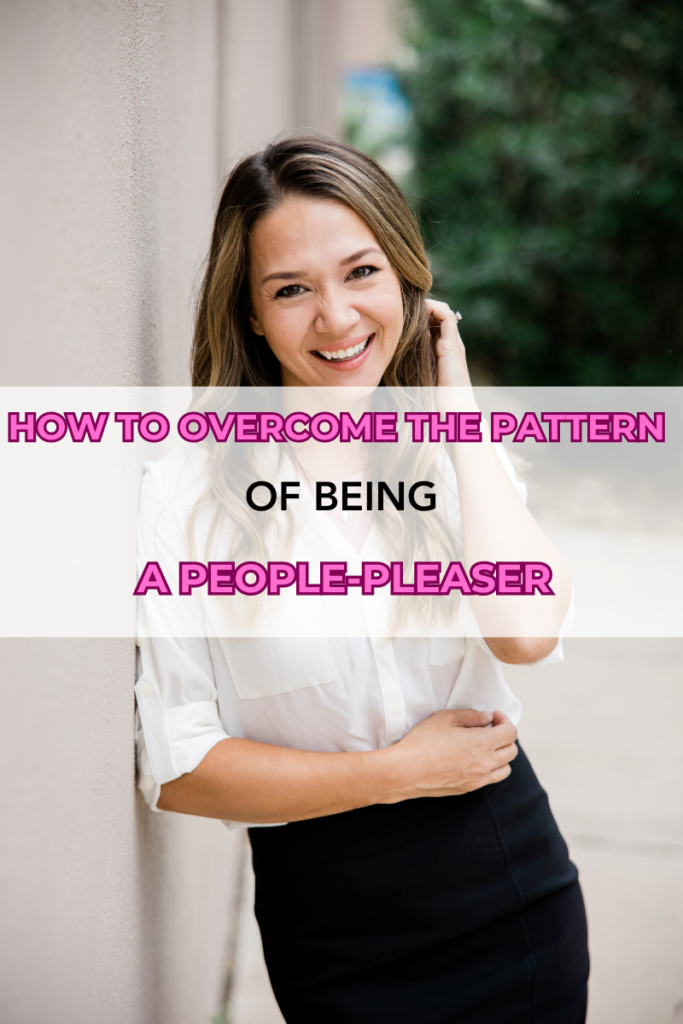This post is about how to stop being a people-pleaser
In school, Sarah was known for always saying yes — yes to new projects, yes to taking on assignments from her classmates, and yes to helping everyone else with absolutely anything. She was well-liked, for sure. However, deep down, she feared rejection, feared losing friends, and was afraid of ending up alone.
Not only that but saying yes led her to become overwhelmed and completely stressed out.
That’s not all. On top of trying to be the happy helper for literally every person who asks for a favor, she has been scared to voice her opinion and instead has been agreeing to everything others say because she fears being criticized when she disagrees.
You can tell that she has never been true to herself…
Does this sound familiar? To me, it does because part of this used to be me. I used to be scared of voicing my opinion, and either agreed with everyone or remained silent. Plus, I used to agree to do things with my friends even though I wasn’t really interested in the activities.
If you can relate to the above scenario as well, then please stick around because together we’ll dig into how you can overcome this pattern of being a people pleaser.

What is a People Pleaser?
A people please is “a person who has an emotional need to please others often at the expense of his or her own needs or desires”, according to Merriam’s Dictionary.
It describes an individual who puts all their efforts into making sure others are happy, always meeting their wants and needs. But in the process of prioritizing everyone else, they often end up neglecting their own needs, forgetting what’s essential for their own well-being.
Signs of a People Pleaser
In a 2022 study, it was revealed that 22% of individuals believe being a people pleaser is either always or usually a positive trait. Distinguishing between being a people pleaser and simply being kind can be challenging. Here are some indicators to help you identify if you tend towards people-pleasing:
- You rarely say ‘no’ to others, and when you do, you feel guilty.
- You care a lot about what other people think of you.
- You fear being rejected or liked less when you decline requests.
- You find yourself agreeing to things you’re not genuinely interested in.
- You are always sorry, even for things you haven’t done.
- You don’t take time for yourself because you are busy making everyone else happy.
- You tend to agree with people even when you have a different perspective.
Recognizing these signs can be a step towards understanding your own behaviors and tendencies.
Why and How Do We Become People Pleasers?
To break the pattern, you first need to understand the root cause. Oftentimes, these reasons circle back to the fear of rejection or being afraid of failure.
1. It’s in our DNA
Long ago, our ancestors stuck together in groups to stay safe. If someone didn’t fit in or wasn’t accepted, it could mean they didn’t get enough food or might be in danger from others. This basic need to be part of a group and the fear of being left out might be why we still want to make others happy today – because being liked and accepted was really important for our ancestors to survive.
2. Childhood
Take a moment to ponder your childhood relationships. If your parents’ love hinged on meeting their desires and needs, that could be a reason why you’ve carried this behavior into adulthood. Alternatively, you might have picked up people-pleasing tendencies from parents who were people-pleasers themselves.
3. We Had to Be Nice to Others
From a young age, we’re taught the value of kindness and politeness. That’s generally a positive lesson, right? Yet, if we consistently prioritize niceness over expressing our thoughts due to a fear of rejection, it can be a bit too much.
4. We Fear Rejection
Did you know that experiencing rejection activates the same part of our brain as physical pain? This underscores the extent of our fear of rejection. When faced with rejection, our brain develops strategies to avoid a repeat scenario. At the end of the day, we’re social creatures longing to belong and be cared for.
Negative Effects on Well-Being
While being a kind and caring person is a wonderful quality, there can be consequences when you consistently prioritize others over yourself, driven by a fear of rejection or seeking constant approval.
1. Tiredness and Stress
First and foremost, playing the role of the go-to person for everything can be draining and overwhelming. Juggling numerous responsibilities to ensure others’ happiness often results in perpetual fatigue. You’re likely taking on too much, but as a human with the same 24 hours in a day, you end up feeling tired and stressed.
2. Self-Neglect
Moreover, always being available to others and neglecting your own needs to put everyone first can lead to self-neglect. While you are trying to make everyone else around you happy, you forget to make yourself happy, too.
3. Being taken Advantage of
As those around you begin to realize that you’re consistently the one offering a helping hand, there’s a chance they might start taking your support for granted. They come to see you as the go-to person who’s always ready to assist, so it becomes almost second nature for them to seek your help. It’s like they already expect you to be there for them, no matter what.
How to Stop Being a People-Pleaser
Embarking on the journey to break free from the people-pleasing cycle might feel challenging, especially when many might not even realize they’re entangled in it. But hey, now that we’ve looked through the signs to spot if you’re a people pleaser, let’s dive into the steps.
1. Start Small
Taking those first steps to overcome this habit can be tough. I get it. Begin with small strides that lay the foundation for lasting change. Challenge yourself to say “No” the next time someone asks for a favor that doesn’t align with your values or when you simply don’t have the time. I know it will feel uncomfortable at first, but as you train yourself to say “No” more often, you will get used to it faster than you think.
2. Stop Apologizing
Of course, if you know you made a mistake, you should apologize. However, it’s crucial to resist the urge to apologize for every little thing, especially when you haven’t actually done anything wrong. I totally get it – saying “Sorry” can become almost reflexive, like saying “Thank you” or “Hi.”
It’s like the word slips out without a second thought. That’s why I made a conscious effort to train myself to think before I speak. Just take a few seconds to pause and weigh whether an apology is genuinely necessary. It’s a small tweak, but it can make a big difference.
Instead of offering apologies for being too late, you could express gratitude by saying, “Thank you for your patience in waiting for me.” This way, you convey appreciation without the need for an apology while maintaining a positive tone.
3. Stop Apologizing for Saying “No”
Just as you shouldn’t apologize for every little thing, or things you didn’t even do, you most definitely shouldn’t apologize for saying “No.” I understand it might feel like letting people down, and there’s this tendency to feel sorry for yourself. Thoughts might crop up, wondering if they’ll like you less now that you’ve finally stood up for yourself and put your needs first.
But, here’s the crucial part to remember – you never need to feel sorry for putting your needs first. I know it’s unfamiliar territory when you start saying “No” more often, but, as I mentioned before, you will get used to it. It’s a journey, and with each “No,” you’re reclaiming a bit more space for yourself.
4. Take Your Time Before Making a Decision
You might be wondering, “Well, how long do I need to think before making a decision?” The answer is simple: as long as you need. Personally, I’ve always found saying, “I need some time to think about it; let me get back to you later” to be not just accepted, but respected.
It’s a strategy that helps me decide on my terms. Sometimes, I know right away if it’s a yes or a no, and other times, I need a few hours to decide. It’s about finding what works best for you.
5. Set Goals for Yourself
As someone who leans towards people-pleasing, your goals might have taken a backseat to everyone else’s. That needs to change. At the end of the day, this is your life, and making the most of it is your right.
Kickstart this shift by setting both short-term and long-term goals. Write down everything you want to accomplish and the vision you want to create for your life. Want to make it even more tangible? Consider crafting a Vision Board on Pinterest.
Most importantly: don’t apologize for putting yourself first. In fact, be proud of it. You probably have a lot of catching up to do in terms of things you haven’t tried or goals you’ve put on hold to make others happy. But now it’s time to make yourself happy.
6. Set Boundaries
I know this is a tough one. People often make it sound so easy, but let’s be real, it’s quite the challenge. Yet, if we skip this crucial step, we’re setting ourselves up to be taken advantage of.
Take work, for instance – setting boundaries might mean not working on weekends or not making overtime a regular thing.
Yes, it’s tough, but sometimes we’ve got to communicate our boundaries with those around us. It helps them understand us better.
And here’s a tip: when initiating these conversations, start with “I” statements. For example, you could say, “I feel disrespected when you talk over me. Could you please stop doing that? Otherwise, I might need to end the conversation.” This approach breaks the cycle of endless finger-pointing, creating a clearer path forward.
7. Surround Yourself With Supportive People
Let’s face it, not everyone is going to respect your boundaries, no matter how well you communicate them. It’s a hard truth. Sometimes, the best move is to part ways with these individuals. It’s tough, but wouldn’t you rather be surrounded by people who genuinely respect you and your boundaries?
I can’t emphasize this enough – it’s crucial. I believe this is most important because keep in mind that people who love and value you for who you are won’t be upset with you for putting yourself first or voicing your opinion. You can just be your true authentic self around them without feeling guilty.
8. Build Internal Validation
As a people pleaser, you are constantly seeking validation elsewhere instead of validating yourself. Your self-worth becomes tied to the way other people perceive you and the opinions they hold. This way, you will never live a life true to yourself.
To change that, start by prioritizing your needs. By doing so you will rely less on external validation for your sense of worth.
Think about the things that truly matter to you, ones you might have forgotten along the way. What brings you joy? What lights you up?
Realize that other people’s opinions only matter to an extent. What truly matters is what you think about yourself.
Now, breaking free from this pattern doesn’t mean turning your back on helping others. Instead, it means helping from a genuine place, not out of fear of rejection. It’s a shift towards aligning your actions with what you authentically want to do.
Bottom Line
Keep being kind and offering help – that’s a wonderful trait. The tricky part is when fear becomes the driving force behind your assistance.
It’s time to shift the focus back to yourself and your needs. What truly brings you joy? What lights you up?
Next time someone seeks your help, stop for a second and ask yourself whether you actually can help at this moment and whether it aligns with your values. It is totally okay to say “No”, and you can be proud of putting yourself first.
References
- Sato T, McCann D. Sociotropy-autonomy and interpersonal problems. Depress Anxiety. 2007;24(3):153-62.
- Lemos M, Vásquez AM, Román-Calderón JP. Potential Therapeutic Targets in People with Emotional Dependency. Int J Psychol Res (Medellin). 2019 Jan-Jun;12(1):18-27.
- Asnea Tariq, Ethel Quayle, Stephen M Lawrie, Corinne Reid, Stella W.Y. Chan (2021). Relationship between Early Maladaptive Schemas and Anxiety in Adolescence and Young Adulthood: A systematic review and meta-analysis, Journal of Affective Disorders, 295, 1462-1473.


